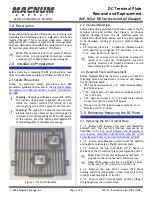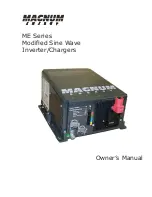
4. Manually set the transfer switch to the UTILITY
position, i.e., load terminals connected to the util-
ity power source side.
5. Turn ON the utility power supply to the transfer
switch, using the means provided (such as a util-
ity main line circuit breaker).
6. Set the AUTO/OFF/MANUAL switch to AUTO.
Then set the generator’s main circuit breaker to
its ON (or closed) position. The system is now
ready for automatic operation.
7. Turn OFF the utility power supply to the transfer
switch.
With the AUTO/OFF/MANUAL switch at AUTO, the
engine should crank and start when the utility source
power is turned OFF. After starting, the transfer
switch should connect load circuits to the standby
side. Let the system go through its entire automatic
sequence of operation.
With the generator running and loads powered by
generator AC output, turn ON the utility power supply
to the transfer switch. The following should occur:
• After about 13 seconds, the switch should transfer
loads back to the utility power source.
• About one minute after retransfer, the engine
should shut down.
2.6
ADJUSTING THE REGULATOR
(NATURAL GAS ONLY)
Although the generator has been factory set to pro-
vide maximum power, it may be necessary in some
areas to adjust this setting. Because natural gas has
different BTU or power content across the country
the engine may not perform as designed.
If experiencing engine problems at high or full load
conditions follow these steps. It will require a fre-
quency meter to perform this procedure.
1. Turn off utility power to the main distribution
panel in the house. This can be done by switching
the service main breaker to the off or open posi-
tion.
2. Allow the generator to start before loading the
generator. Confirm the no-load frequency with
the roof open and door off is set at 63-63.5 Hz.
Transfer load to emergency circuits.
3. Turn on appliances, lights, pumps, etc., that are
on the emergency circuits in an attempt to fully
load the generator. Be cautious not to overload
the generator. Use the following chart as a guide:
4. When 3/4 load has been achieved. Connect a fre-
quency meter to the output lugs of the generator’s
main line circuit breaker.
5. The fuel regulator is fitted with one (7 kW), or two
(12 & 15 kW) adjustment screws. While watching
the frequency meter, slowly turn the adjustment
screw clockwise or counterclockwise one at a
time until highest frequency is read on the meter.
Only limited adjustment is available between the
set pins. Under no circumstances should any of
the pins be removed (Figures 2.1 and 2.2).
Figure 2.1 — Dual Fuel Regulators
410
Adjustment
Screw
(One Side
Only)
Set
Pin
V-twin
Adjustment
Screw
(Both Sides)
Set Pin
(Both Sides)
-
6. When the highest frequency is reached maximum
power has been set. Then turn both adjustment
screws 1/4 turn counterclockwise. Regulator is
now set.
Figure 2.2 — Placement of Regulator
Adjustment Screw
7. Turn utility power to the main distribution panel
back on. This can be done by switching the ser-
vice main breaker to the on or closed position.
Allow the generator to shut down.
Section 2 — Post Installation Start-up and Adjustments
Air-cooled 7 kW, 12 kW and 15 kW Generators
Unit
120 Volts
240 Volts
7 kW
50.0 amps
25.0 amps
12 kW
100.0 amps
50.0 amps
15 kW
108.3 amps
54.2 amps
12















































